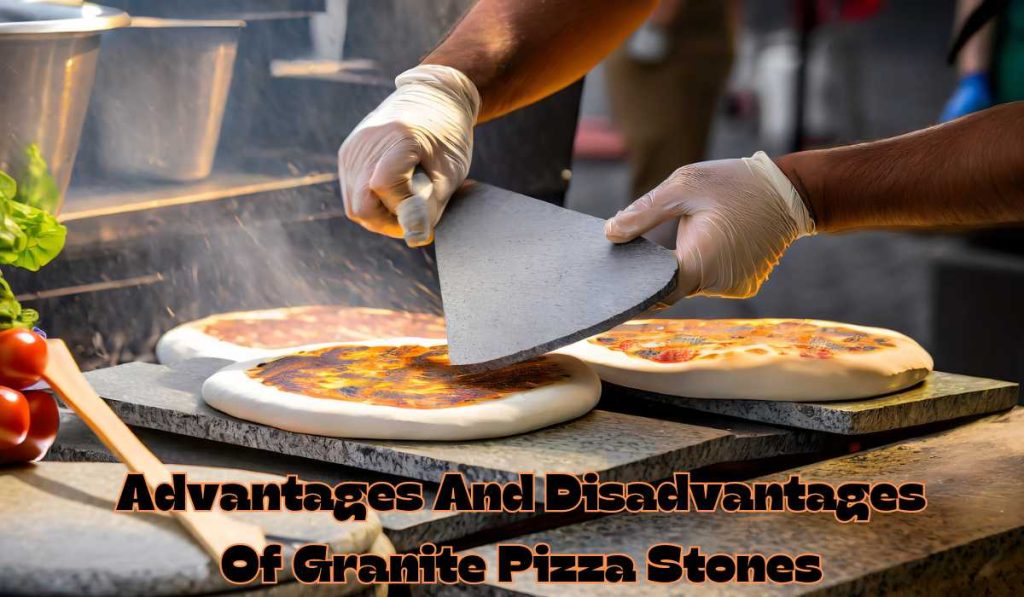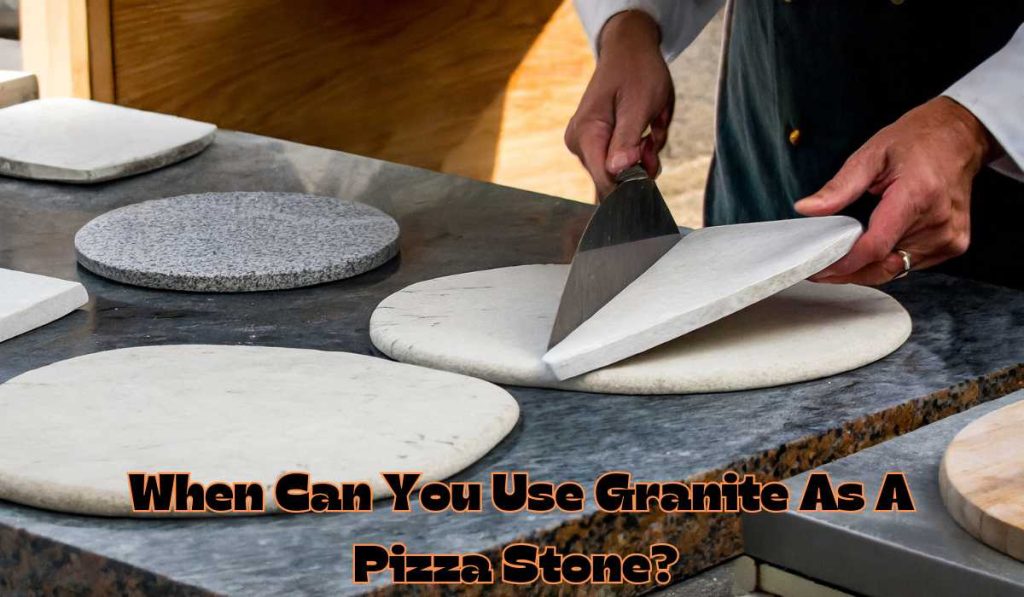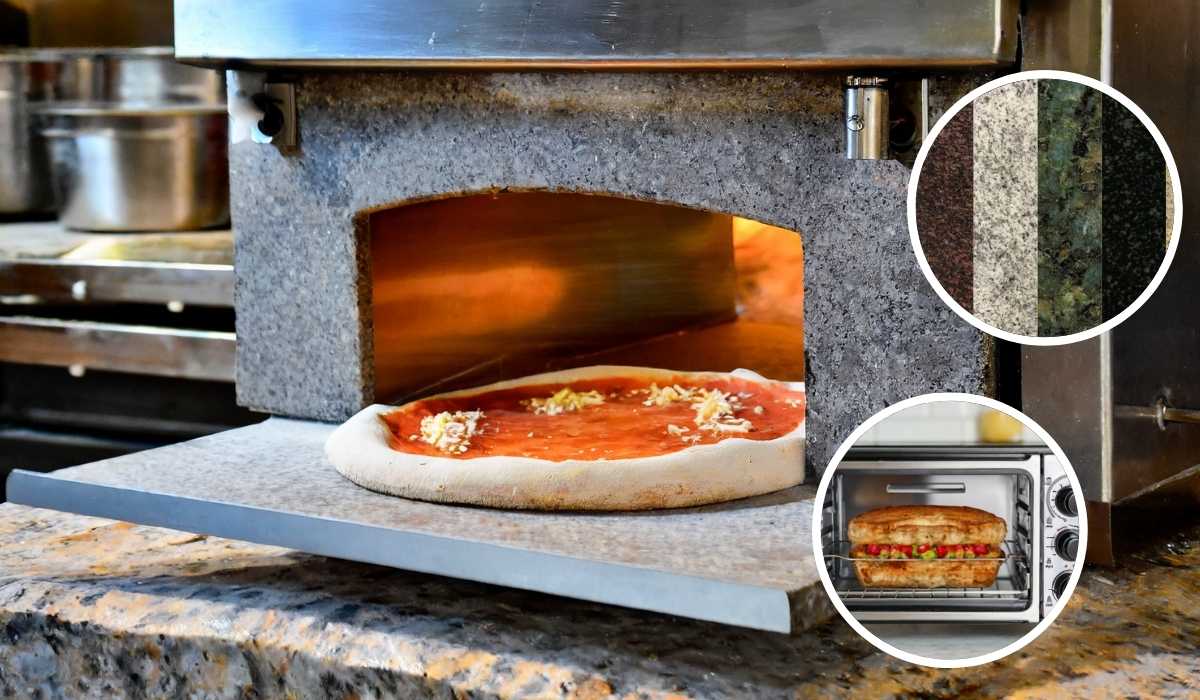In my depth research on granite, It can be recommended that granite is strong and can handle heat, it is usually not a good idea to put it right in a pizza oven. Granite is a natural stone that can handle some high temperatures, but it’s not made to handle the sudden and extreme changes in temperature that happen inside a pizza oven. Because it is so hot, granite can crack or chip when it comes in contact with it.
I have observed that firebricks, refractory materials, or special oven-grade stones are the best materials for building pizza ovens because they can handle high temperatures without breaking or cracking. These materials were made to withstand the high temperatures and changes in temperature that happen inside pizza ovens.
However, if you want to build a pizza oven, you should use firebricks or other oven-specific refractory materials that can handle the high temperatures needed to bake desserts and are safe for cooking.
Granite holds heat very well, making it ideal for grilling pizzas. In other words, your pizzas will cook. Additionally, it is unbreakable, so you won’t need to worry about breaking or cracking it when cooking. I’ll go over the advantages and disadvantages of granite for pizza ovens, differences and after that provide some advices and related facts on how to begin using granite in a pizza oven and so on.
A Brief History Of Granite
Granite is a natural stone that has been used for centuries in buildings. It is a durable material, making it perfect for use as a cooking surface in pizza ovens. Because granite absorbs heat so well, pizza will cook. Granite is also non-porous and simple to keep clean and maintained over time.
This makes it the greatest choice for people who want to produce delicious homemade meals. Pizzas without having to worry about damage. Their oven or spending hours scrubbing away at grime. With its long history of use in both construction and cooking. Granite could be what you need to take your pizza-making skills up a notch!
Granite For Pizza Oven-Need to Know
Depending on the variety of granite and its intended use, it may or may not be possible to use granite in a pizza oven.
Here’s how it works:
Granite slabs for the oven floor:
In broad terms, it’s not a good idea because granite can break and flake when it comes into direct contact with flames, particularly if the temperature changes quickly. This is because different minerals inside the stone expand and shrink at different rates when heated and cooled.
Exceptions:
Several very thick and heat-resistant granites, like “Bianco Sardo,” might work, but it’s still important to talk to a skilled stone worker and follow their construction steps.
Other options:
Soapstone is the best natural stone for floors in pizza ovens because it keeps heat in well and doesn’t break down easily. Firebricks are also a good choice.
For tables, walls, or pizza peels, granite:
Safe to use:
Granite blocks that have been polished or sharpened look great on tables, the outside of ovens, and pizza peels. They look sleek and expensive and are simple to clean and take care of.
Good things:
Because granite is naturally cool, it keeps the dough from adhering to the peel while it’s being moved. Its strength means that tables and exteriors will last for a long time.
Advantages And Disadvantages Of Granite Pizza Stones

As with any material, granite pizza stones have both advantages and disadvantages.
Utilizing granite has many advantages, including its excellent heat retention, which allows pizza to cook. It also won’t crack or break, making it perfect for harsh temperatures in a pizza or toaster oven. Granite is non-porous. So you don’t have to worry about bacteria or food particles getting trapped inside.
But granite does need some maintenance since it needs to be sealed to prevent staining. Granite can also be quite heavy, which may make moving or storing your pizza stone. It is difficult if you’re limited in space in your kitchen.
A comparison Table on Advantages And Disadvantages Of Granite Pizza Stones
| Feature | Granite | Soapstone | Firebricks | Cordierite |
| Heat Resistance | Moderate | Excellent | Excellent | Excellent |
| Heat Retention | Good | Excellent | Good | Good |
| Cracking Risk | High | Low | Low | Low |
| Price | Moderate to High | High | Low | Moderate |
| Weight | Heavy | Heavy | Heavy | Moderate |
| Portability | Difficult | Difficult | Difficult | Easy |
| Non-Stick Surface | No | Yes (after seasoning) | No | No |
| Maintenance | Sealing required | Occasional sealing | Low | Low |
| Aesthetics | Stylish | Rustic | Industrial | Rustic |
| Best for: | Countertops, exteriors, pizza peels | Oven floor, all-around use | Budget-friendly oven floor | Oven floor, portable option |
Advantages Of Using Granite In Pizza Ovens
Granite pizza stones have some advantages that make them perfect for cooking pizzas. As mentioned earlier, granite retains heat well, meaning your pizzas will cook. Additionally, granite is durable and won’t crack or break – even in high temperatures. And since granite is non-porous. No need to worry about food particles or bacteria getting trapped inside.
Finally, granite is easy to maintain since it needs to be sealed to prevent staining and cracking. With proper care and maintenance, your granite pizza stone can last for years. You are making it a great investment for those looking to make delicious homemade pizzas.
Disadvantages Of Using Granite In Pizza Ovens
As with any material, granite pizza stones have some drawbacks. One of the main disadvantages is that granite can be quite heavy. They are making it difficult to move or store if you’re limited in space. Additionally, granite does need some maintenance to prevent staining and cracking. Something that may not be ideal for those who don’t have time to clean their pizza stone.
Can You Use Granite As A Pizza Stone
Based on the type of granite and how you plan to use it, you might be able to use it as a pizza stone.
Following is how it works:
For the oven floor:
Not usually a good idea: A pizza oven’s high heat and quick temperature changes can cause the marble to crack and chip, even though some say it can work. This can happen even with high-quality granite because different minerals in the stone expand at different rates when heated. A huge crack down the middle of a beautiful pizza would ruin it.
Not always: Some very thick and heat-resistant granites, like “Bianco Sardo“, might work, but it’s still important to talk to an expert stone mason and follow their installation steps.
Other options:
Soapstone: This raw stone is great for floors in pizza ovens. It keeps heat in very well, cooks pie evenly, and can handle the high heat without any problems.
Firebricks: People also like firebricks, which are heavy-duty bricks. They last a long time, can handle heat, and aren’t too expensive. But they might not keep heat in as well as soapstone, so you might need to shorten the time you cook for a little while.
If you’re using granite for the remainder of your pizza oven:
Tops: Granite blocks look great on tops of things. They’re smooth, easy to clean, and cool on their own, which keeps the dough from sticking to the pizza peel. They also add a bit of class.
Outside: Depending on the color and finish, granite can make the outside of your pizza oven look sleek, modern, or even rural. It’s strong and won’t break in bad weather, so it’s great for pizza ovens outside.
Pizza peels: Granite pizza peels are a thing of beauty! They’re naturally cool, which keeps pizzas from sticking, and they’re very smooth for sliding pies in and out. Be careful, though, because they can be heavy.
Best Stone For Pizza Oven Floor
What kind of stone is best for the floor of your pizza oven relies on your income, how you plan to use the oven, and the style of cooking you want to do.
Here’s a breakdown of the top contenders:
Soapstone
This is an ongoing winner: soapstone is a natural stone that is very immune to heat and keeps heat very well. This makes sure that the food cooks evenly and has a beautiful crust. It’s also naturally smooth, which makes it simple to put and take pizzas out of the oven.
Pros:
- It heats evenly and keeps heat very well.
- Naturally smooth surface makes it easy to move the pizza around.
- Strong and lasting a long time
Cons:
- It can be pricey
- seals itself every so often to keep its non-stick properties
Firebricks
Firebricks are the least expensive option: A lot of people choose firebricks because they are cheap and last a long time. They can handle the high heat of a pizza oven and keep heat in pretty well.
Pros:
- Relatively inexpensive
- Can handle high heat
- Simple to set up and keep up
Cons:
- It doesn’t keep heat in as well as soapstone.
- Perhaps pizzas will need a little longer to cook.
- It might be rough on pizza peels, so sprinkle some flour on them.
Granite
Granite is the stylish option. Although granite might crack if used on the oven floor, it can be a beautiful choice for countertops, exteriors, and even pizza peels. It stays cool on its own, which keeps the dough from sticking and gives your pizza oven a touch of class.
Pros:
- Looks sleek and put together
- Naturally cool to make working with dough easy
- Built to last and immune to the weather for outdoor ovens
Cons:
- Can crack in very hot and very cold weather (not a good choice for the floor)
- Pizza peels are heavy, so be careful when moving them.
As an extra tip
Heat the stone slowly no matter what kind it is to avoid temp stress cracks. This will protect your pizza stone from damage and keep it working for years to come.
In the long run, what you want and need will determine which stone is best for your pizza oven floor. Think about your budget, the way you like to cook, and the look you want to achieve to make the best choice for your pizza-making experiences!
When Can You Use Granite As A Pizza Stone?

Granite is an ideal material for a pizza or baking stone because of its incredible durability. Not only does the granite keep the heat very well, meaning pizzas cook, but it also won’t crack or break.
But granite does need some maintenance to keep it from staining and cracking. It can be quite heavy, so you’ll need to ensure you have the space for it if you want to use granite for your pizza oven. If all these factors are taken into consideration, then granite is a great material for use as a pizza stone.
When Can You Not Use Granite as a Pizza Stone?
Even though granite has some good points, there are times when it wouldn’t be the best choice for your pizza stone.
When you shouldn’t use granite:
Direct Flame Exposure: Direct flame exposure is the worst thing that can happen. The direct, strong heat of fire is too much for granite, especially the usual types. The quick changes in temperature and random heating can lead to stress cracks and spalling, which could damage your pizza stone and even be dangerous.
Rapid Changes in Temperature: Even if your oven doesn’t have direct flames, getting from cold to very hot in a short amount of time can still crack granite. It is very important to heat up slowly and avoid big temperature changes.
Granite of Poor Quality: Not all granites are the same. Avoid thin or low-density granites because they are more likely to crack and won’t keep heat in as well.
Thin Slabs: You should try to get a slab that is at least 1.5 inches thick. With the weight and heat of a pizza, thin granite is more likely to crack and warp.
Unsealed Granite: Sealed granite is better at keeping water out, but unsealed granite can soak up water from the dough, which can cause the pizza to cook unevenly and crack.
Uncertainties: If you’re not sure what kind of granite you have or whether it can handle high temperatures, it’s better to be safe than sorry and choose a different material.
Additional Options: Soapstone, firebricks, and even cordierite are all great alternatives to pizza stones that can handle the heat and make great pizzas.
NB: Don’t forget that safety and tasty pizza come first! Enjoy your pizza-making activities as long as you use the right tools.
Can You Put A Toaster Oven On Granite
Most of the time, you can put a toaster oven on a granite counter. Because granite is naturally resistant to heat, it can handle the low temperatures of a toaster oven.
Remember these things:
Under it, put a trivet or heat pad: Even though granite can handle the heat, it’s still a good idea to use a trivet or heat pad to protect it even more. The surface will be safer from heat damage this way, especially if you use the toaster oven on high for a long time.
Do not put hot things directly on the granite: The granite can handle the heat, but it’s best to wait a little while for things like freshly baked pizzas or toast to cool down before putting them on the tabletop. This will make it even less likely that there will be heat marks or cracks.
Clean up spills promptly: When you spill something acidic on granite, like tomato sauce or vinegar, it can scratch the surface if you don’t clean it up right away. If you want your marble to look its best, clean up any marks right away.
NB: If you following these easy steps, you won’t have to worry about using your toaster oven on your beautiful marble surface.
How To Use Granite In A Pizza Oven
If you decide to use granite as a pizza stone in your pizza oven. There are some steps you should take to ensure it lasts and performs.
First, ensure the granite is sealed with a food-grade sealant before using it. This will help protect the stone from staining and cracking over time.
Prior to cooking, you need to make sure the oven is preheated for at least 20 minutes. This will help ensure that they are distributed throughout the range and that your pizzas are cooked.
Finally, once you’re finished cooking your pizza. Let your granite cool off by turning off the oven but leaving it closed for another 10-15 minutes. This will prevent any sudden temperature changes. Which can cause the granite to crack or break.
Best Safety tips on : Can Granite Be Used In A Pizza Oven
Here are the five best ways to use granite in a pizza oven:
Pick thick, high-quality rock every time: Browse for granites that don’t soak up water easily and have a fine-grained surface.
Get advice from experts: Talk about your job with stone masons or oven builders who have experience and understand how granite works.
Follow the right steps for installation: When you need to, use heat-resistant mortar, expansion joints, and support.
Slowly heat the granite: Don’t heat it too quickly to avoid thermal stress cracks.
Take care of your granite surfaces: For the best cleanliness and looks, clean and seal your granite worktops and peels on a regular basis.
Remember that granite can make your pizza oven look more elegant, but safety and usefulness should come first. Carefully think about what you need, pick the right type of granite, and get help from a professional to get a good result.
Final Recommendations
Granite and refractory brick are both excellent materials for use as a pizza stone in your oven. At the same time, granite is ideal because of its incredible heat retention capabilities. It needs maintenance to keep it from staining or cracking over time.
Refractory brick is also an excellent choice due to its ability. Withstand high temperatures and promote even airflow throughout the oven.
As a whole or overall, I am recommending the following things, you may consider depending your liking and demanding:
Granite: Gorgeous for exteriors, countertops, and peeling, but not recommended for the oven floor owing to cracking hazards.
Soapstone: The best option for pizza stones, but it’s costly and bulky.
Firebricks: Although firebricks are more affordable and long-lasting than soapstone or cordierite, they do not retain heat as well.
Cordierite: Not as fashionable as soapstone or granite, but lightweight and portable with good heat resistance.
Depending on your unique demands, you should base whatever you decide to use. As well as preferences – but no matter what, ensure that you maintain it so that your pizza stone will last for years!
xvideos,
porn,
hentai,
porn,
xnxx,
sex việt,
Phim sex,
mp3 download,
MÚSIC MP3,
Define Npv,
hentai,
free porn xx,
Tom Life Insurance Review,
Is It Better To Pay Credit Card Before Statement,
Anime xxx,
phim xxx,
Free MP3,
phim xnxx,
Chinese Sex,
phim xxx,
xtube,
Ncl Trip Insurance,
gay brasileiro xxx,
sex,
BR sex,
xxx,
How Does Apple Music Voice Work,
Jav hd,
December In Washington Dc,
black horny old man eat pussy,
sexo forte,
Hot Topic Canada,
Craigslist Search All,
Hentai haven,
sex,
FAQs
What Is The Best Stone For A Pizza Oven?
The best stone for a pizza oven is granite. Granite retains heat very well, so your pizzas will cook. Additionally, it’s durable and won’t crack or break – even in high temperatures. It also requires some maintenance to prevent staining. But with proper care, your granite pizza stone can last for years.
Is Granite Safe To Use As A Pizza Stone?
Yes, granite is generally safe to use as a pizza stone. As long as it is sealed with a food-grade sealant before use, there is no risk of toxins from oven leaching into the food. Since granite is non-porous, there’s no need to worry about food particles. Or bacteria getting trapped inside.
What Stone Is Used For The Pizza Oven Floor?
The most common stone used for the pizza oven floor is refractory brick. A study on Compressive behavior of refractory ceramics at elevated temperatures recommended that refractory brick is heat resistant and can withstand temperatures up to 2,000°F (1,093°C). It’s also very porous, which helps promote even airflow throughout the oven. Ensures that your pizzas cook.
What Is The Best Cooking Surface For A Pizza Oven?
The best cooking surface for a pizza oven is either granite or refractory brick. Granite maintains heat incredibly effectively and is unbreakable. Making it the perfect material for pizza ovens. Refractory brick is also an excellent choice. Because it can withstand high temperatures and promotes even airflow.
Reference:
Tamer, F. G. (1988). Compressive behavior of refractory ceramics at elevated temperatures (Doctoral dissertation, Massachusetts Institute of Technology).

Tammy E. Edison is a distinguished specialist in the world of kitchen appliances, and she is proud to be a part of the dynamic team at kitchenusers.com. With a background in engineering and a passion for culinary innovation, Tammy E. Edison has established herself as a go-to expert for all things related to kitchen appliances technology.


